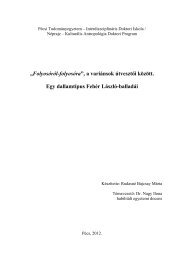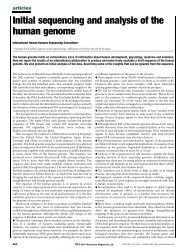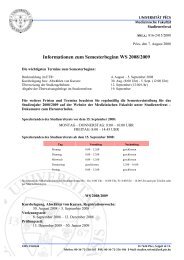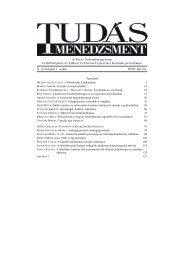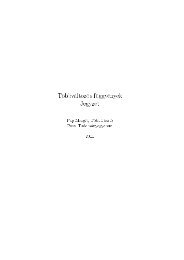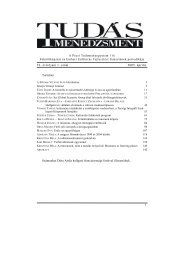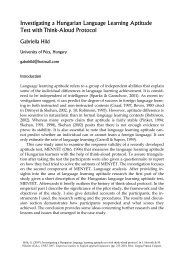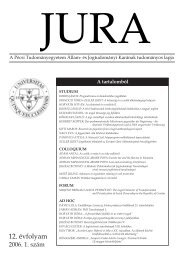Predictors of Foreign-Language Anxiety: Examining the ...
Predictors of Foreign-Language Anxiety: Examining the ...
Predictors of Foreign-Language Anxiety: Examining the ...
Create successful ePaper yourself
Turn your PDF publications into a flip-book with our unique Google optimized e-Paper software.
and observed values <strong>of</strong> participants’ anxiety scores. The squared partial correlationvalues are suggestive <strong>of</strong> a large effect size (i.e. > 26) for L2-self-concept, and amedium one (i.e. >13 but < 26) for competitiveness, as in <strong>the</strong> full model.This finding, with <strong>the</strong> signs <strong>of</strong> <strong>the</strong> regression coefficients also taken into account,suggests that high levels <strong>of</strong> FLA were associated with a combination <strong>of</strong>competitiveness and negative L2-related self-perceptions. In o<strong>the</strong>r words, anxiousstudents in <strong>the</strong> sample tended to express a strong desire to compete with <strong>the</strong>irpeers in <strong>the</strong>ir English classes, nurturing, at <strong>the</strong> same time, a ra<strong>the</strong>r negative L2-self-image, manifested in low-rated TL skills, dissatisfaction with current level <strong>of</strong>pr<strong>of</strong>iciency, unfavourable evaluations <strong>of</strong> FL competence and aptitude relative topeers, lack <strong>of</strong> TL self-confidence, as well as finding <strong>the</strong> learning task difficult, andfeeling little control over its outcome.DiscussionThe purpose <strong>of</strong> this study was to explore <strong>the</strong> contributions <strong>of</strong> cognitive, affective,and personality variables with respect to <strong>the</strong> prediction <strong>of</strong> first year English majorparticipants’ FLA. The correlational analyses revealed (1) a very strong link betweenanxiety and L2-self-concept, (2) a strong relationship with pr<strong>of</strong>iciency level,(3) weaker but significant associations with <strong>the</strong> two personality characteristics:moderate with competitiveness, and low with perfectionism, and (4) no significantrelation to FL aptitude and strength <strong>of</strong> motivation. When <strong>the</strong> effect <strong>of</strong> all sixlearner characteristics was examined concurrently, as has been shown, only two <strong>of</strong><strong>the</strong>m, L2-self-concept and competitiveness, were found to be significant predictors<strong>of</strong> FLA in this sample <strong>of</strong> first year English majors.The fact that it was L2-self-concept, a composite <strong>of</strong> L2-related self-perceptionswhich explained <strong>the</strong> greatest proportion <strong>of</strong> <strong>the</strong> variance in FLA, both in isolationand in <strong>the</strong> presence <strong>of</strong> o<strong>the</strong>r learner variables, underscores <strong>the</strong> importance <strong>of</strong>learners’ beliefs/ subjective feelings about <strong>the</strong>mselves as language learners as akey factor in how much anxiety <strong>the</strong>y experience, supporting some earlier suggestionsin <strong>the</strong> literature (Bailey et al., 1999; Foss & Reitzel, 1991; Horwitz, 1990). Thestrong relationship this investigation revealed between negative L2-related selfperceptionsand high feelings <strong>of</strong> FLA lends empirical support to <strong>the</strong> view in <strong>the</strong>psychological literature that “anxiety arises from a self-assessment <strong>of</strong> personaldeficit in meeting situational demands” (Sarason, 1984, p. 937), in this case, <strong>the</strong>linguistic demands and performance standards <strong>of</strong> university English classes andthose <strong>of</strong> smooth interaction in <strong>the</strong> TL in general. The results corroborate earlierstudies <strong>of</strong> language learning anxiety, quantitative and qualitative ones, indicatingan inverse relationship between anxiety level and self-perceived competence (Bailey,1983; Cheng, 2002; Clément et al., 1980, 1994; Kitano, 2001; MacIntyre et al.,1997; Price, 1991) and self-perceived ability for learning and achieving completemastery <strong>of</strong> a FL (Horwitz & Sadow in preparation referred to in Horwitz, 1990;Horwitz, 1995), and a positive relationship with appraisal <strong>of</strong> difficulty with L2learning (Cheng, 2002; Ganschow et al., 1994).Tóth, Zs. <strong>Predictors</strong> <strong>of</strong> foreign-language anxiety 137



